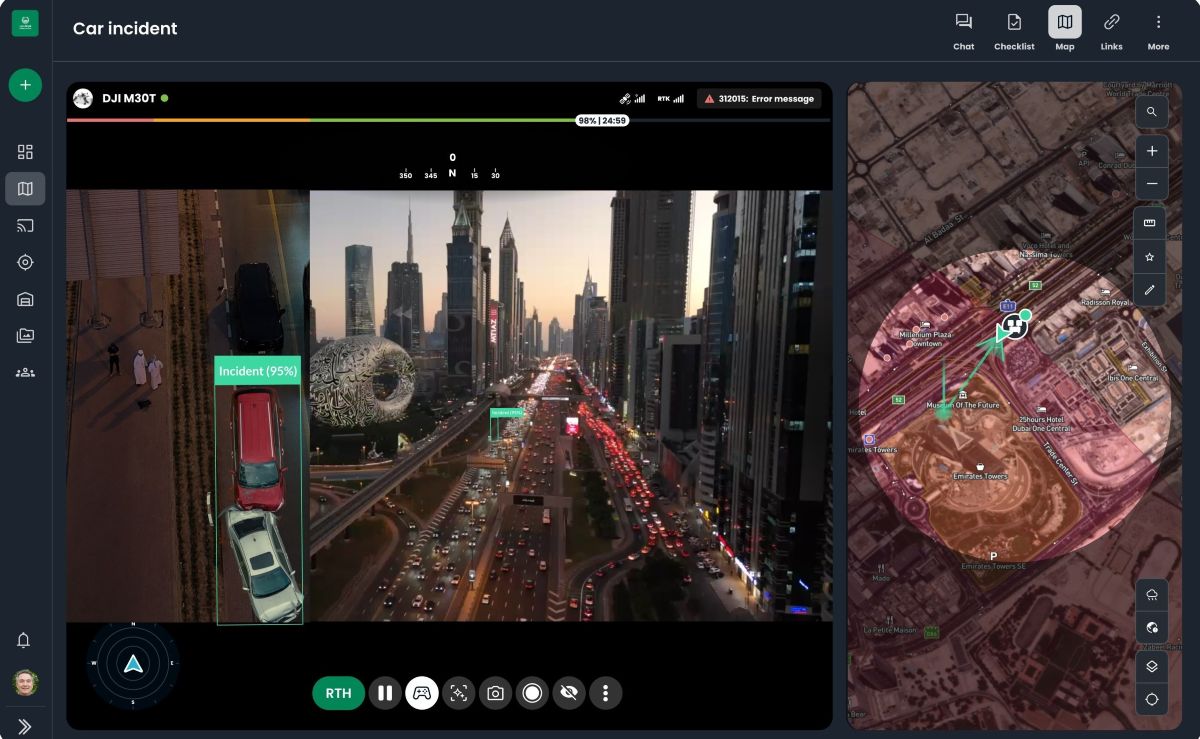Enhancing Policing with Drones: The Dubai Police and AirHub Partnership
Overview of the Partnership
Dubai Police recently announced a significant partnership with AirHub, a cutting-edge drone software company based in the Netherlands. This collaboration is set to revolutionize the way Dubai Police manages its drone operations, further enhancing their already sophisticated aerial systems. The integration aims to streamline operations, improve situational awareness, and strengthen compliance, encapsulating how modern technology can transform public safety sectors.
The Role of AirHub’s Drone Operations Center
At the core of this partnership is AirHub’s innovative Drone Operations Center (DOC). This sophisticated platform will manage and coordinate the expanding fleet of drones operated by Dubai Police. The DOC will facilitate the seamless integration of multiple drone flights, enabling the police force to maintain oversight and effectiveness in real-time mission scenarios—a crucial aspect given the high stakes involved in public safety operations.
Enhancing Drone as a First Responder
The collaboration supports one of the most advanced Drone as a First Responder (DFR) programs globally. By deploying drones in critical situations—ranging from emergency responses to city surveillance and traffic control—Dubai Police aims to improve response times and operational efficiency significantly. With this technology, officers can access aerial imagery and real-time data, allowing them to make informed decisions on the ground.
Operational Efficiency and Tactical Preparedness
Captain Muhammad Omar Al Muhairi, director of Dubai Police’s Unmanned Aerial Systems Centre (UASC), highlighted the operational benefits of this integration: “This collaboration enables us to integrate and streamline our aerial systems under a unified platform.” His statement underscores the strategic importance of the partnership in enhancing not just operational efficiency but also the safety and readiness of police deployments in fast-evolving situations.
Current Drone Operations
The UASC is already an active unit within Dubai Police, conducting multiple drone flights each week. These operations assist in various policing functions, including crowd management during large events and rapid emergency support. AirHub’s scalable platform will now allow these missions to be tracked and optimized, greatly increasing their effectiveness. By utilizing advanced technology, Dubai Police can maintain public order more efficiently and respond to emergencies with greater speed.
A Forward-Thinking Approach
Stephan van Vuren, CEO of AirHub, said, “Working with Dubai Police provides a unique opportunity to develop next-generation capabilities.” This sentiment reflects the forward-thinking nature of the partnership, which positions Dubai Police not just as a consumer of technology but as a leader in innovative public safety solutions. The progressive DFR approach set by the Dubai Police serves as a model for public safety agencies worldwide, showcasing the benefits of integrating modern drone technology into traditional policing structures.
Future Implications
As drone technology continues to evolve and expand, partnerships like the one between Dubai Police and AirHub could set the stage for future developments in law enforcement. Enhanced drone operations may lead to more comprehensive service delivery, ensuring quicker, safer, and more efficient public safety measures. Public perceptions of law enforcement could also shift, as communities observe the proactive measures taken for their safety.
Recent Developments in Drone Technology
Additionally, the drone industry is undergoing rapid advancements, with companies consistently releasing new features and enhancements. For instance, a recent news update highlighted a significant price reduction on DJI Flip drone bundles, tempting many drone enthusiasts and professionals alike. Such market changes often ripple through sectors reliant on drone technology, including public safety and policing.
As these developments continue, it becomes increasingly clear that the integration of technology and traditional policing methods is not just beneficial—it’s essential for modern public safety.


